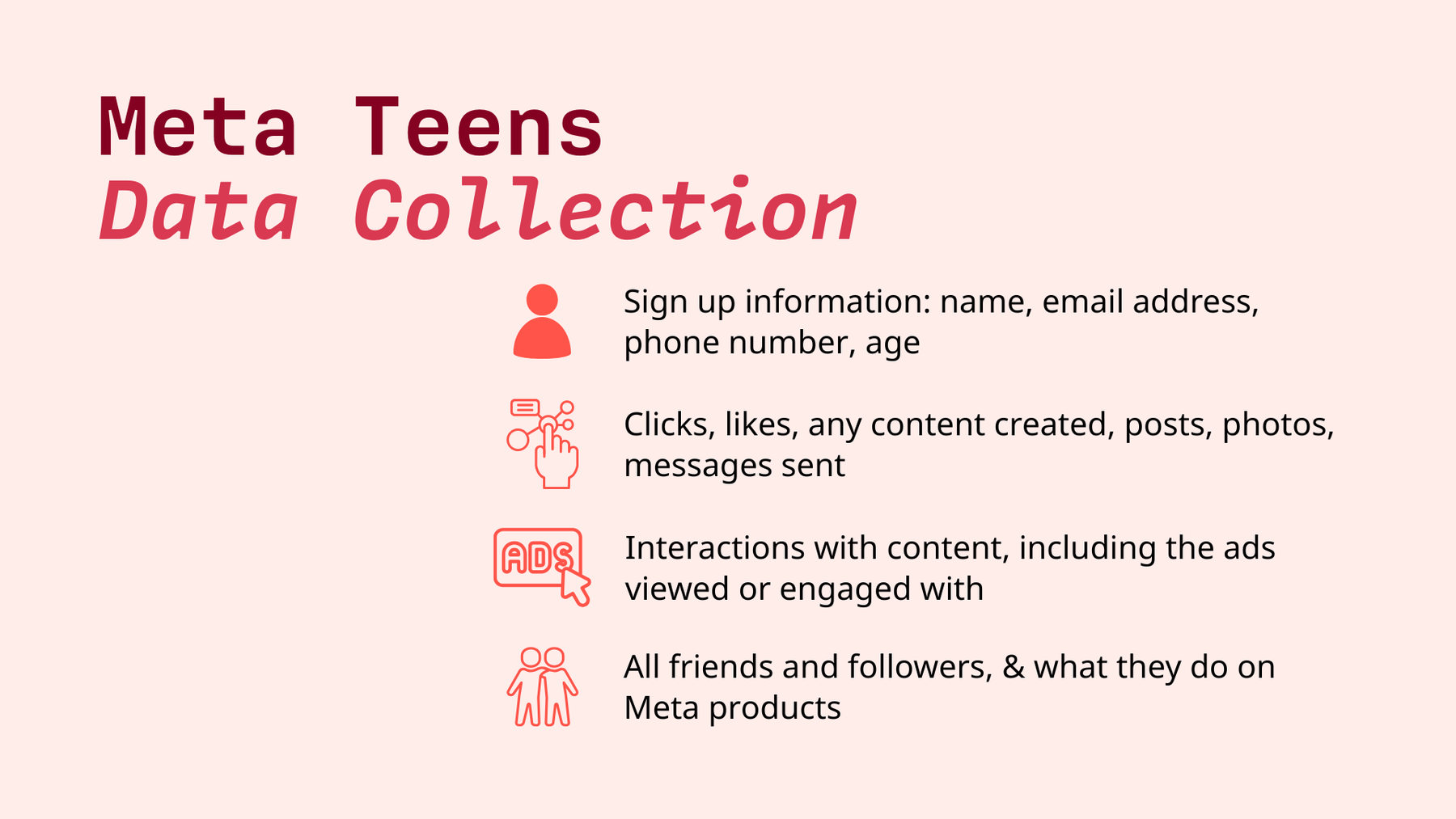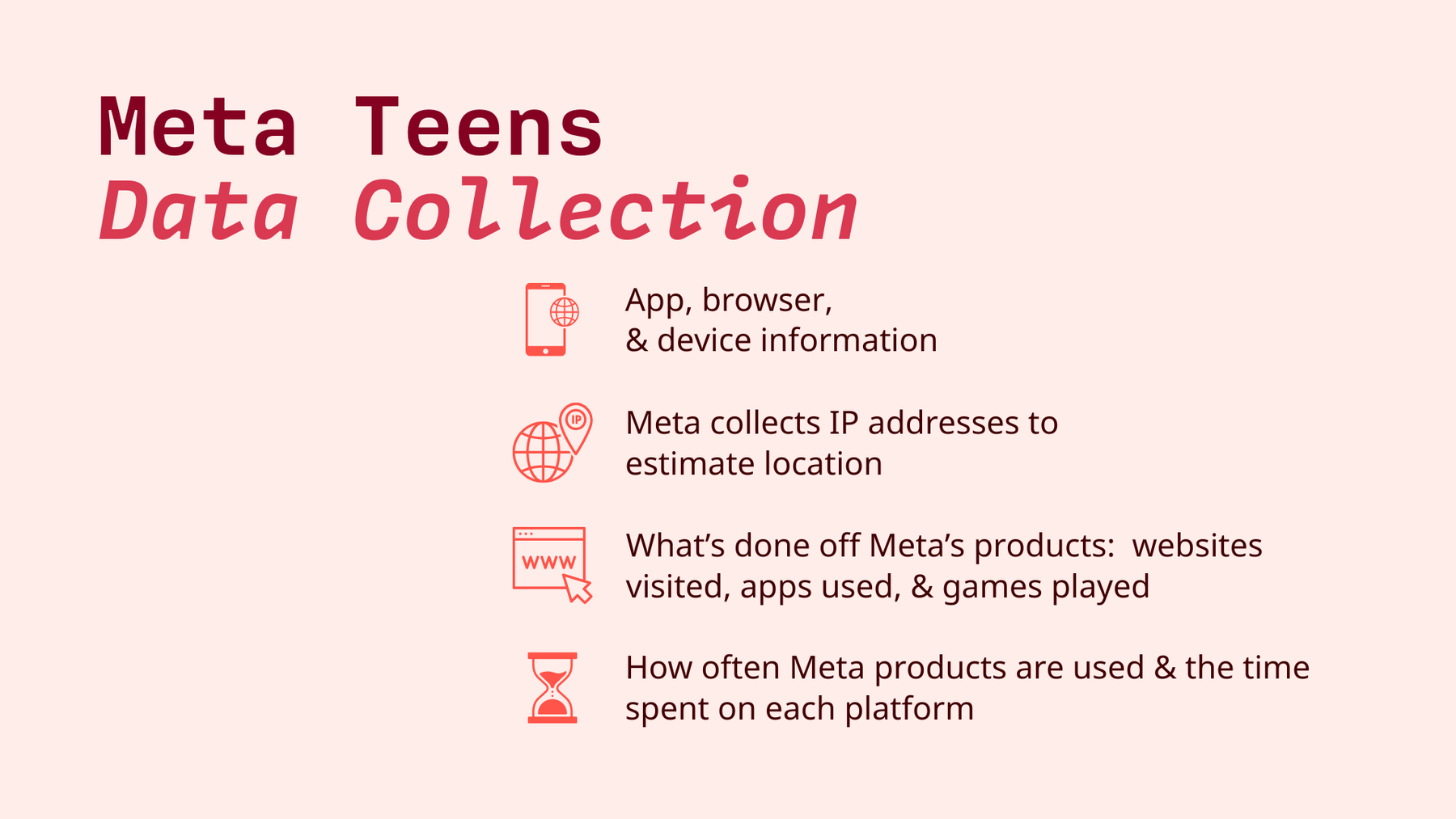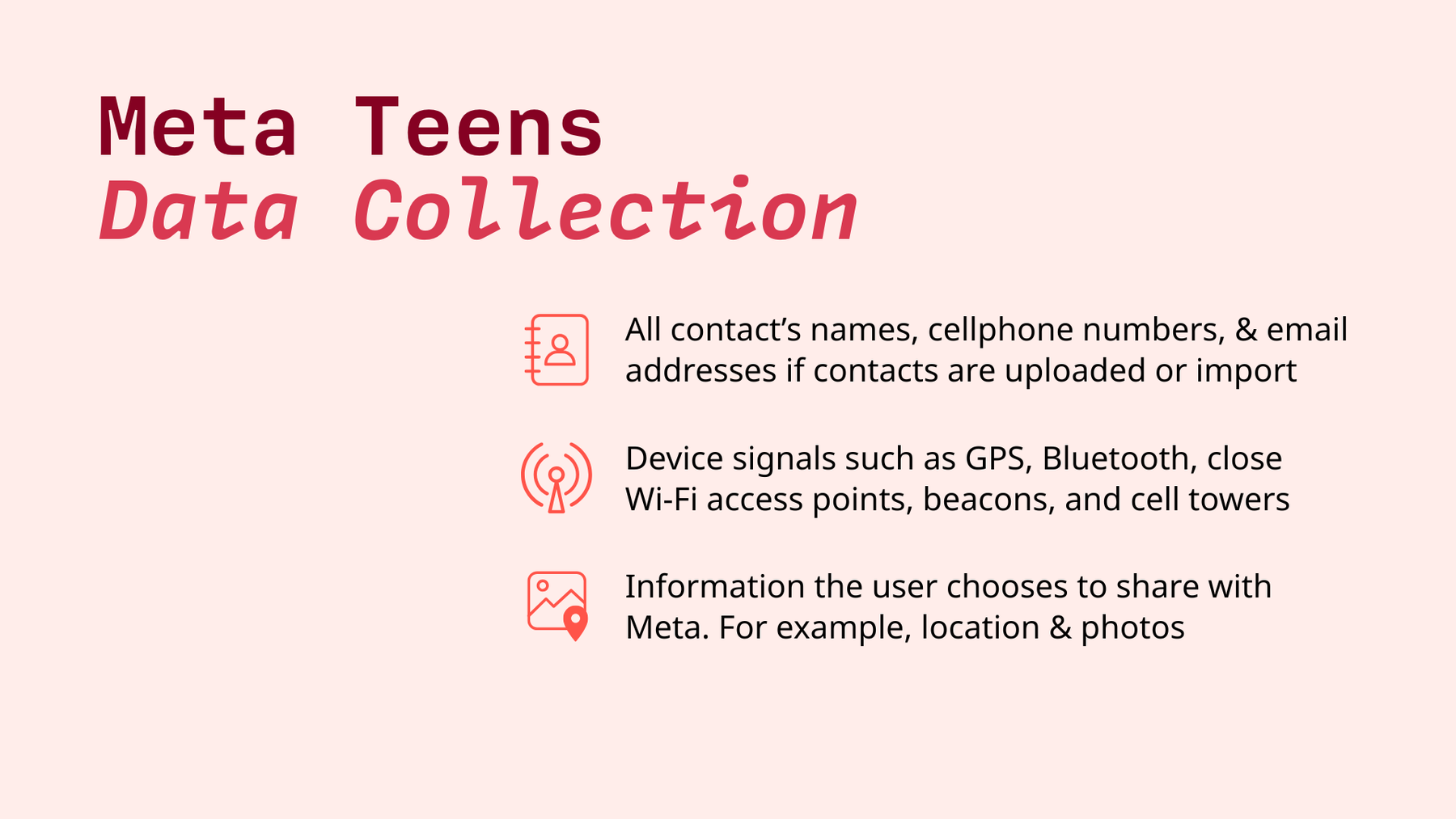Gli account Instagram per adolescenti sono davvero protetti, anche da Meta?
Gli account Instagram per adolescenti possono aiutare a proteggersi dalle minacce online, ma questo non significa che siano protetti dalla raccolta di dati di Meta.
L’obiettivo di Instagram Teen Accounts è quello di creare funzioni che migliorino la privacy, la sicurezza e il benessere degli utenti Meta di età inferiore ai 18 anni. Ma ridurrà anche la raccolta di dati dai vostri figli?
Le funzioni rilasciate per proteggere meglio gli adolescenti da minacce online come persecutori e stalker o da contenuti sessuali sono un passo nella giusta direzione, soprattutto ora che queste stesse protezioni sono state introdotte in Facebook e Messenger. Purtroppo, però, questo non significa che i dati privati dei vostri ragazzi siano esenti dalla raccolta invasiva di Meta. Vediamo cosa significa la Teens Feature e come si differenzia dall’account Instagram di un adulto.
La Teens Feature di Meta non protegge i dati di vostro figlio
Meta ha preso provvedimenti per proteggere meglio gli adolescenti che utilizzano le sue piattaforme dagli altri utenti, ad esempio assicurandosi che gli adolescenti non possano visualizzare immagini sessuali esplicite o che siano più protetti da persone sconosciute che cercano di contattarli con messaggi diretti. Tuttavia, anche se tutto ciò sembra positivo all’esterno e può essere utilizzato da Meta per il marketing, nasconde il fatto che Meta continua a raccogliere i dati degli adolescenti, a tracciarli e a trarre enormi profitti dai dati raccolti. Quindi no, i dati dei vostri adolescenti non sono protetti e la loro privacy è a rischio anche con gli account Instagram per adolescenti.
L’introduzione di questi account per adolescenti viene pubblicizzata come la soluzione perfetta per proteggere meglio gli adolescenti, ma si tratta di un “lavaggio della privacy” da parte delle Big Tech . Queste nuove funzionalità sono state create per convincere gli utenti di una maggiore privacy per gli adolescenti, ma purtroppo gli utenti più giovani non sono ancora veramente protetti quando utilizzano Instagram o qualsiasi altra piattaforma di social media.
Quali dati raccoglie Meta sugli adolescenti
Prima di immergerci nell’analisi dei dati raccolti da Meta Teens, è importante sapere che i prodotti Meta, Facebook e Instagram traggono profitto dalla raccolta e dalla vendita dei dati degli utenti. FaceBook, in particolare, è noto per l’eccessivo tracciamento e le pratiche invasive di raccolta dei dati.
Se leggete regolarmente i nostri articoli, saprete anche che quando si tratta di servizi online gratuiti come Facebook e Google, il prodotto siete voi. Lo stesso vale per gli adolescenti che utilizzano gli account Instagram Teen e altri prodotti Meta. Per gli adolescenti che utilizzano i prodotti Meta, sono state apportate alcune piccole modifiche ai dati raccolti e al loro utilizzo. Queste modifiche sono riportate nell’informativa sulla privacy.
Anche se il vostro adolescente ha un account Meta Teens, Meta continua a tracciare e raccogliere molti dei suoi dati.
Quali dati raccoglie Meta dagli utenti di età inferiore ai 18 anni?
- Tutte le informazioni necessarie per l’iscrizione: nome, indirizzo e-mail, numero di telefono, età.
- Ciò che fanno sulla piattaforma: click, like, qualsiasi contenuto creato, post, foto, messaggi inviati
- Le interazioni con i contenuti, compresi gli annunci che hanno visualizzato o con cui si sono confrontati
- Tutti gli amici e i follower e ciò che fanno sui prodotti Meta
- Informazioni su app, browser e dispositivi
- Anche se le impostazioni dei servizi di localizzazione sono disattivate, Meta raccoglie comunque gli indirizzi IP per stimare la loro posizione.
- Ciò che viene fatto al di fuori dei prodotti Meta: i siti web visitati, le app utilizzate e i giochi.
- La frequenza di utilizzo dei prodotti Meta e il tempo trascorso su ciascuna piattaforma.
- Se caricano o importano contatti, Meta raccoglie tutti i nomi, i numeri di cellulare e gli indirizzi e-mail dei contatti.
- Segnali del dispositivo come GPS, Bluetooth, punti di accesso Wi-Fi vicini, beacon e torri cellulari.
- Informazioni che l’utente sceglie di condividere con Meta attraverso le impostazioni del dispositivo, ad esempio la posizione e le foto.
Come Meta utilizza i dati degli adolescenti
La maggior parte delle entrate di Meta proviene dalla pubblicità sulle sue piattaforme. A tal fine, Meta raccoglie i dati degli utenti e li vende agli inserzionisti che, in cambio, creano annunci pubblicitari mostrati a gruppi mirati di persone che hanno maggiori probabilità di interagire con l’annuncio, con l’obiettivo di aumentare le vendite.
Nell’informativa sulla privacy di Meta, l’azienda spiega che elabora le informazioni degli utenti per comprendere i loro interessi e preferenze e per creare un’esperienza personalizzata. Sebbene la creazione di un’esperienza personalizzata suoni bene, in realtà ciò significa che i suoi algoritmi scelgono cosa mostrare all’utente e questo ha un’influenza sugli annunci che si vedono.
In Europa, Meta non è autorizzata a mostrare pubblicità a ragazzi di età inferiore ai 18 anni sulle sue piattaforme. Questo è un bene, perché le aziende tecnologiche non dovrebbero avere il controllo su quali annunci pubblicitari vedono i giovani, soprattutto se si considera quanto queste aziende possono dedurre dai dati raccolti. Sfortunatamente, per gli utenti adolescenti di altri Paesi con minori politiche di protezione dei dati, Meta è autorizzata a fare pubblicità negli account Teen con la restrizione che le aziende che fanno pubblicità possono “solo” utilizzare l’età e l’ubicazione dell’utente per determinare gli annunci mostrati.
Una storia di social media dannosi per gli adolescenti
La spinta di Meta a introdurre funzioni per gli adolescenti che utilizzano le sue piattaforme arriva dopo che Frances Haugen ha esposto la ricerca di Meta nel 2021, che dimostrava che l’azienda sapeva che Instagram aveva il potenziale per peggiorare i problemi di immagine corporea degli adolescenti. Da allora, il gigante tecnologico ha affrontato numerose cause legali legate ai suoi effetti negativi sugli adolescenti. Ad esempio, nel 2023, più di 30 Stati americani hanno citato in giudizio Meta per le accuse che il gigante tecnologico ha consapevolmente e deliberatamente creato funzioni su Facebook e Instagram che creano dipendenza e peggiorano la salute mentale dei giovani.
Ancora più recentemente, mercoledì scorso, nel corso di un’audizione della sottocommissione giudiziaria del Senato degli Stati Uniti, l’informatrice di Meta, Sara Wynn-Williams, ha rivelato che Meta, che all’epoca si chiamava Facebook, indirizzava agli adolescenti di età compresa tra i 13 e i 17 anni annunci pubblicitari basati sul loro stato emotivo, ad esempio quando si sentivano giù o depressi.
Abbiamo brevemente evidenziato tre diverse occasioni in cui Meta è finita sotto tiro ed è stata smascherata per il modo in cui ha trattato e utilizzato i dati dei suoi utenti di età inferiore ai 18 anni. Se siete interessati a saperne di più, vi consigliamo di dare un’occhiata alla serie The Wall Street Journals, The Facebook Files, che ha scoperto che Facebook sapeva di avere delle falle che hanno causato gravi danni.
Ci si può fidare di Meta?
Meta è una Big Tech che trae profitto dalla pubblicità, ed è per questo che offre i suoi prodotti gratuitamente, in modo da poter raccogliere i dati degli utenti. E come abbiamo visto in precedenza, vostro figlio non è esente dalla raccolta invasiva di dati da parte di Meta. Ciò che appare chiaro è che gli account Teen di Meta sono un passo per proteggere i vostri figli dai predatori online. Ma di certo vostro figlio non è protetto da Meta stesso. Gli adolescenti vengono ancora tracciati, i loro dati raccolti e Meta sa molto più di quanto dovrebbe su di loro.
Il fatto che Meta abbia affrontato numerose battaglie legali legate all’uso dei suoi prodotti da parte di adolescenti è motivo di preoccupazione e dovrebbe essere un grande segnale di allarme per i genitori preoccupati. Anche se Meta sta cercando di rendere più sicura l’esperienza degli adolescenti con i suoi Teen Accounts, è difficile guardare oltre le sue pratiche passate non etiche che hanno portato a danneggiare gli adolescenti.
Se questo atteggiamento di Meta cambierà in futuro rimane discutibile, anche a causa del modo in cui l’intelligenza artificiale è stata introdotta nei prodotti Meta, senza la possibilità di scegliere di non utilizzarla: Meta Ai è ora presente in WhatsApp e non può essere disattivata: scopri qual è la migliore alternativa a WhatsApp nel 2025!
Cos’è la funzione Teens di Meta?
Meta Teens è stata introdotta per la prima volta su Instagram nel settembre del 2024, e ora viene estesa a Facebook e Messenger. L’obiettivo degli account Teen di Meta è quello di proteggere meglio gli adolescenti online grazie alle protezioni integrate. Per impostazione predefinita, gli adolescenti di età inferiore ai 18 anni vengono inseriti in questi account e per gli utenti di età inferiore ai 16 anni è necessario il permesso dei genitori per modificare le funzioni di sicurezza aggiunte.
Restrizioni di Meta sotto i 18 anni
- Gli utenti sotto i 16 anni non possono accedere al sito
- Gli account sono impostati come privati per impostazione predefinita
- Gli adolescenti possono ricevere messaggi solo dalle persone che seguono o a cui sono collegati
- Le restrizioni sui contenuti sensibili bloccano i contenuti sensibili che altrimenti apparirebbero sul loro feed.
- Gli adolescenti possono essere menzionati o taggati solo dalle persone che seguono.
- La funzione anti-bullismo garantisce il filtraggio di parole e frasi offensive.
- Promemoria per interrompere l’utilizzo dell’app dopo 60 minuti.
Inoltre, Meta permette ai genitori di avere un maggiore controllo sull’account dei propri figli. Ad esempio, Meta ha introdotto funzioni che consentono ai genitori di vedere chi ha inviato messaggi all’adolescente (senza poterli leggere), di impostare limiti di tempo giornalieri, di bloccare l’account per periodi specifici e di vedere gli argomenti visualizzati dal figlio.
Nel complesso, sebbene l’account per adolescenti sia un passo nella giusta direzione, sembra proprio che Meta lo stia facendo solo per soddisfare i legislatori, non per cambiare davvero la sua app o renderla meno coinvolgente per gli adolescenti. Questo, e il fatto che Meta stia ancora raccogliendo tonnellate di dati dai vostri adolescenti, dovrebbe farvi pensare due volte se permettere a vostro figlio di scaricare effettivamente Instagram.





